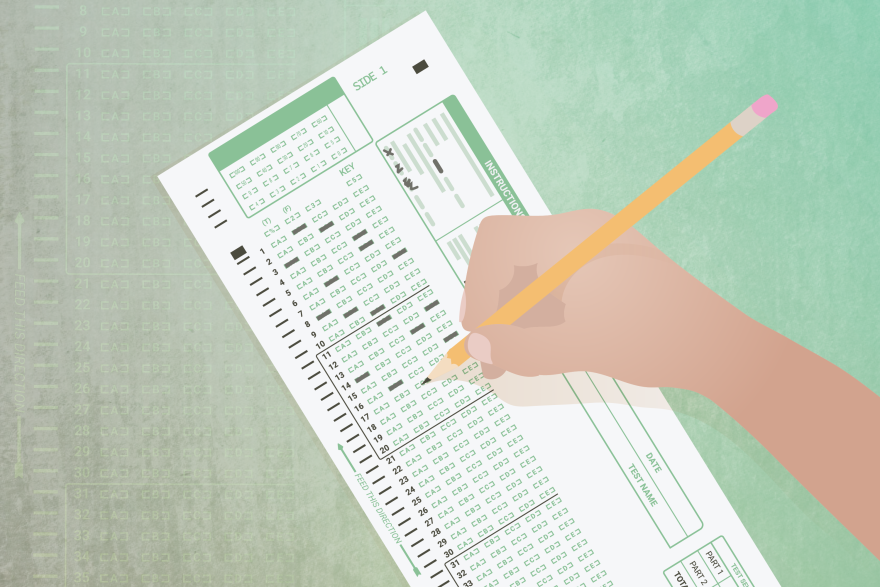Missouri’s education department is holding firm on the need to administer standardized testing this spring, even as teachers and parents say it’s a waste of valuable instructional time and the cause of undue stress on kids.
Missouri will not use test scores in calculating a district’s annual performance scores, but education officials and researchers say the scores are necessary to benchmark learning during the pandemic.
Missouri’s Department of Elementary and Secondary Education “is committed to administering statewide assessments this school year; that has not changed,” spokeswoman Mallory McGowin said. The department now has the backing of the Biden administration.
Teachers, meanwhile, counter that there are much better ways to measure a student’s progress than the state exams, and in a year already so heavily altered by the pandemic, every available minute should be spent on instruction.
“The simple answer for the vast majority of our educators is, this is a bad use of time. This has been the most disrupted school year ever,” said Pat McPartland, president of Parkway’s teachers union.
Students in third grade through eighth are expected to take tests every spring in English, math and science, while high schoolers take subject matter “end of course” exams or the ACT. The scores are usually a big part of a district’s annual performance score calculated by the state, though they won’t be factored in this year.
When the pandemic forced schools to shut their doors in mid-March, it was just a few weeks before statewide assessments were scheduled to begin. Education Commissioner Margie Vandeven canceled the tests, saying then that it was not the right time.
Vandeven’s move was possible because the federal education department waived testing requirements last year. The Department of Education last month said that states need to resume testing, calling it “vitally important.”
Illinois’ state education agency tried to cancel spring tests in early February.
“We believe it is more important to focus on supporting our students’ transition back to in-person learning than to focus on assessments,” said Illinois Education Commissioner Carmen Ayala in a letter.
Other states made similar moves, but the U.S. Department of Education denied the waiver requests. Maryland said it will administer a scaled-back version of its annual assessments.
Missouri is also trying to make it easier on school districts to assess students. It expanded the testing window and won’t include any sample questions.
But Missouri is requiring tests be taken in person, despite a large percentage of students still learning remotely from home. Sixty percent of St. Louis Public Schools students are learning virtually, so the district will have to scale up transportation, food services and supervision for several weeks in order to administer the exams.
“It doesn’t make a lot of sense,” said Dorothy Rhode Collins, president of the St. Louis school board.
Districts are usually expected to have 95% of their students take the exams.
“We are going to be pushing every student to take the test,” SLPS Superintendent Kelvin Adams said.
The federal education department has said it may grant waivers to the normal high participation bar, but if large numbers of parents opt out, or districts like SLPS are unable to get more than half of its students to come to school for just a few days, researchers say that could skew data by leaving out the scores of vulnerable students.
Missouri’s education department said it is tracking whether test-takers have been learning from home or in a classroom and a student’s internet access. Researchers say that could be valuable insight, as long as enough students from each group end up taking the tests.
“Understanding what's going on in schools is important,” said Cory Koedel, an education economist at the University of Missouri-Columbia. “The question will be how comprehensive will the test be this year?”
Koedel said comparing 2021 test scores to 2019 numbers is still possible and helpful to administrators.
Asking children to come to school for the first time in over a year just to sit down for a test will only heighten an already stressful situation, said Amanda Walker Johnson, an anthropologist at the University of Massachusetts-Amherst who has studied the effect of testing on kids.
“It just doesn't seem to me to be the environment that can properly test just testing,” she said. “What you'll get is the impact, the effect of anxiety. And so I don't see how it can accurately represent what students know.”
The testing data is important to have, researchers say, even if it’s messy and incomplete.
“It is definitely not perfect,” said Emily Cupito, managing director of St. Louis University’s Prime Center for educational research. “I think we will have to have an asterisk on this year. But if we don't do it at all, it's just going to be less information that we then have to make decisions on for the future.”
Jeanne Norris’ son has done virtual school, which she said was stressful on both of them. She then did homeschooling, and finally, in-person third grade since early February. The switch back to a classroom was rocky at first, but Silas is adjusting.
Norris, whose family lives in St. Louis County, said she trusts her son’s teacher to know if he’s on pace over the state tests, which won’t return results until the fall.
“She knows what he can and cannot do, and where he needs to go next because of that,” she said.
Norris is also considering opting Silas out of testing this year.
Follow Ryan on Twitter: @rpatrickdelaney




